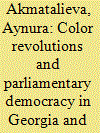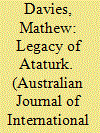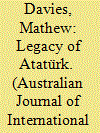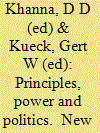|
|
|
Sort Order |
|
|
|
Items / Page
|
|
|
|
|
|
|
| Srl | Item |
| 1 |
ID:
127636


|
|
|
|
|
| Publication |
2013.
|
| Summary/Abstract |
The media of Kyrgyzstan described Georgia after the Rose Revolution of 2003 as a country that has made giant strides in economic recovery, suppressing corruption, and reform of its police and education system. The two countries increased their cooperation after the Tulip Revolution of 2010 in Kyrgyzstan; today, it has taken the form of an exchange of diplomatic and political experience and youth programs. Trade turnover between the two countries is expected to top $1.4 million.
These two Soviet successor-states, which adhere to different sociocultural and economic traditions, chose a practically identical road leading first to the presidential form of government and then to parliamentary democracies. This choice made after the color revolutions of 2003 in Georgia and 2005 and 2010 in Kyrgyzstan was suggested by the universal model of democracy that had gained popularity all over the world and was primarily a mechanism for legitimizing the power of the new people inside and outside the country. So far, parliamentary democracy in both countries has not developed enough to produce unambiguous results. It is much more important to understand how the changes were accepted and substantiated through an analysis of public discussions, discussions in the media and on the Internet, as well as in official documents, interviews, and statements by the leaders.
|
|
|
|
|
|
|
|
|
|
|
|
|
|
|
|
| 2 |
ID:
127075


|
|
|
|
|
| Publication |
2013.
|
| Summary/Abstract |
There exists a significant and sustained difference between the ability of the European Union to successfully socialise those member states who have joined since the fall of Communism, and its apparent inability to similarly socialise Turkey. Despite some impressive legal and constitutional reforms since 2001, a key shortcoming remains, the unwillingness of many in the Turkish judiciary to implement those revised standards in a consistent way. Existing explanatory accounts of this inability would focus on the credibility of the Union offer of membership, the duration of negotiations or the importance of Turkish domestic standards. None of these, however, are able to account for why Turkey seems to occupy a half way position, exhibiting reformed laws but unreformed legal practice. To address this shortcoming this article shall combine existing scholarship on the importance of domestic normative contestation within Turkey with an appraisal of the shortcomings of the Union's conditionality policy itself that emerge from the conceptual studies of conditionality.
|
|
|
|
|
|
|
|
|
|
|
|
|
|
|
|
| 3 |
ID:
127073


|
|
|
|
|
| Summary/Abstract |
There exists a significant and sustained difference between the ability of the European Union to successfully socialise those member states who have joined since the fall of Communism, and its apparent inability to similarly socialise Turkey. Despite some impressive legal and constitutional reforms since 2001, a key shortcoming remains, the unwillingness of many in the Turkish judiciary to implement those revised standards in a consistent way. Existing explanatory accounts of this inability would focus on the credibility of the Union offer of membership, the duration of negotiations or the importance of Turkish domestic standards. None of these, however, are able to account for why Turkey seems to occupy a half way position, exhibiting reformed laws but unreformed legal practice. To address this shortcoming this article shall combine existing scholarship on the importance of domestic normative contestation within Turkey with an appraisal of the shortcomings of the Union's conditionality policy itself that emerge from the conceptual studies of conditionality.
|
|
|
|
|
|
|
|
|
|
|
|
|
|
|
|
| 4 |
ID:
047967


|
|
|
|
|
| Publication |
New Delhi, Macmillan India Limited, 1999.
|
| Description |
xxvii, 328p.
|
| Standard Number |
0333933060
|
|
|
|
|
|
|
|
|
|
|
|
Copies: C:1/I:0,R:0,Q:0
Circulation
| Accession# | Call# | Current Location | Status | Policy | Location |
| 043913 | 320/KHA 043913 | Main | On Shelf | General | |
|
|
|
|
| 5 |
ID:
047833


|
|
|
|
|
| Publication |
New Delhi, Manas Publications, 2000.
|
| Description |
304p.
|
| Standard Number |
8170491215
|
|
|
|
|
|
|
|
|
|
|
|
Copies: C:1/I:0,R:0,Q:0
Circulation
| Accession# | Call# | Current Location | Status | Policy | Location |
| 043834 | 355.033054/SAI 043834 | Main | On Shelf | General | |
|
|
|
|
| 6 |
ID:
105974


|
|
|
|
|
| Publication |
2011.
|
| Summary/Abstract |
Turkey has often been projected as a model by the US-based think tanks and Western media for enlargement of market democracies in its surrounding regions to contain the surge of radical Islam. The appropriateness of the Turkish democracy as a model is, however, contested by many from within the region and without. While the Arabs ridicule Turkey's democracy as a farce and a 'democracy of tanks', Western critics harp on its illiberal character as reflected in the titular powers and reserved domains of military, high level of human rights abuse and denial of cultural liberties to the minority Kurds. It is in the past decade, particularly since the European Union's (EU) decision in December 1999 to accept Turkey's candidacy for membership that the country has experienced radical political reforms signifying a qualitative transformation of its polity to a liberal democracy. The purpose of this article is not to assess Turkey's progression to liberal democracy or to analyse the domestic debate spurred by the reform process between the progressive Islamists and the secular establishment. Instead, it aims at examining the function of Turkey's EU accession process in facilitating the second historic transition of Turkish polity (the first being the change-over from mono-party to multi-party system in 1946).
|
|
|
|
|
|
|
|
|
|
|
|
|
|
|
|
|
|
|
|
|